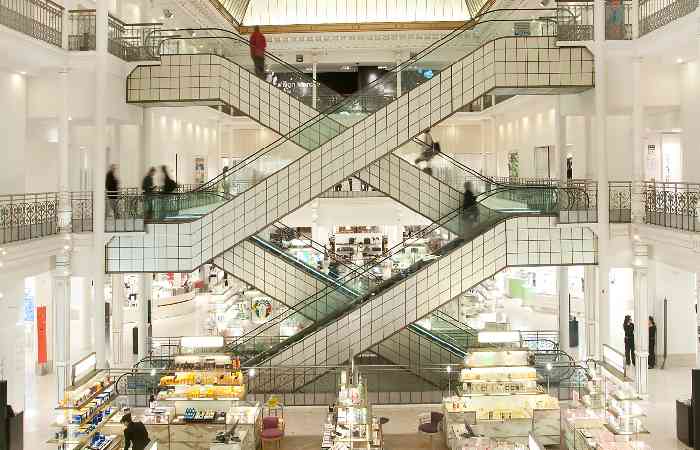Hi, I hope you are having a good day! A department store is a retail establishment offering a wide range of consumer goods in different areas of the store, each area (“department”) specializing in a product category. Department stores typically sell a variety of clothing, accessories, home goods, electronics, furniture, and more. They often have a large selection of products and brands and offer various services, such as gift wrapping, alterations, and delivery. They remain also seen as a symbol of luxury and status. For further information, please follow us along the end of the article.
Table of Contents
Department Store – Explaining
Department Store is a retail establishment that trades a wide variety of goods. These usually include ready-to-wear clothing and accessories for adults and children, yard goods and household textiles, small household goods, furniture, electrical appliances and accessories, and food. These goods are separated into divisions and departments supervised by managers and buyers. There are also departmental divisions of merchandising, advertising, service, accounting, and budgetary control.
Department stores are often top-secret according to the kinds of goods they carry and their prices; specific categories include discount, general merchandise, fashion or high fashion, and speciality. Many offer extra services, including gift wrapping, alterations, delivery, and personal shopping.
Some of the essential Definitions of a Department Store are Enumerated Under
“A departmental store is a large trade business unit that handles a profound change of shopping and speciality goods and is planned into separate departments for promotion, service, and control. An inclusive variety of food under one roof is grouped into a defined department that is centrally controlled and caters primarily to women shoppers.
Advantages of a Department Store – Explained!
The main benefits or advantages of a supermarket are low price, rapid and extensive scale sales, low operating costs, freedom of choice for the consumers and a large amount of profit
The top advantages of a departmental store are (1) Economy of Bulk Purchases, (2) Providing a Variety of Products, (3) Suitability of Choice, (4) Economy in Advertising, (5) Centrally Located, (6) If Services to Customers (7) Employing Experts and (8) Lesser Selling Costs.
Economies of Bulk Purchases
A departmental store purchases its products in large quantities, thereby enjoying the economies in price, transportation cost, trade discounts, etc.
Providing a Variety of Products
A departmental store provides different changes of products under one roof. It caters to the total wants at one place, and they need not go from one place to another to make purchases.
The suitability of excellent:
The regulars can select the goods of their excellence and taste from a large variety of goods of different excellent products.
The Economy in Advertising by Department Store
Large scale advertising operations are undertaken by big departmental stores warranting savings in advertising costs. At the same time announcement of one department serves as the advertisement for the other department.
Disadvantages of Department Store
There are various advantages of a supermarket; at the same time, there are also disadvantages. The significant disadvantages of supermarkets are the requirement of huge capital, appropriate location, no personal attention, not suitable varieties of products, etc.
The Main Drawbacks or Disadvantages of supermarkets are as Follows:
Huge capital required
A considerable amount of capital requires to establish a supermarket. It needs to operate in a massive building for which a large amount of rent needs to be paid.
Need for a central place
Central, as well as good places, desire to found supermarkets. Supermarkets can not operate everywhere. It becomes challenging to find appropriate locations to show supermarkets, even if they become costly.
Lack of personal attention by Department Store
Another disadvantage of a supermarket is the lack of personal care. The employees and also other staff do not salary good care. The workers do not care for the customers. The customers should bring goods up to security by themselves to pay bills. Most of the clients, especially women shoppers, do not like this.
Unsuitable for all products
Only some products, which customers know ventes in supermarkets. Some goods clarify by sellers to the customers for their information. So, the harvests unknown to customers cannot trade out in supermarkets.
The Features of Departmental store. How are they different from Numerous Shops or Chain Supplies?

A departmental store is a significant creation offering a sweeping change of products, secret into well-defined sections, aimed at satisfying practically every customer’s need under one roof. It has some departments, each one confining its activities to one kind of creation, e.g., there may be separate departments for soaps, medicines, furniture, groceries, electronics, clothing and dress material. Thus, they satisfy various market parts with multiple goods and services.
Some of the critical Features of a Departmental Store are as follows:
- A modem departmental store may offer all facilities such as restaurants, restrooms, etc. In this way, they try to provide full service to a higher class of customers for whom price is of secondary importance.
- These stores are generally located in a central place in the city, which caters to many customers.
- They generally form as a joint-stock company. Succeed by a board of directors as the size of these stores is very large.
A departmental store trusts both the functions of a transaction and warehousing. They purchase directly from producers and also operate separate granaries, eliminating undesirable mediators between producers and customers. Chain stores or multiple shops retail shops own and used by manufacturers or intermediaries. Under this arrangement, many shops with similar appearances establish in areas. Spread over different parts of the country, indifferent to departmental stores based in a central city. These shops by the same group and have equal merchandising strategies, with identical products and also displays. These shops usually deal in standardized and also branded consumer products, which have quick sales and turnover.
Conclusion
A department store great store divides into departments that sell such crops as furnishings, electronics, clothing, footwear, toys, cosmetics, and sometimes groceries. The central communication of department store selling is that customers can see discovery just about anything they need in the store and under one roof. A department store has several departments under the same roof to facilitate buying, customer service, and selling. A department store large store separates into departments that sell such crops as furnishings, electronics, clothing, footwear, toys, cosmetics, and groceries.
Also Read: What is Binary Value? – Definition, Advantages, Converting, And More


